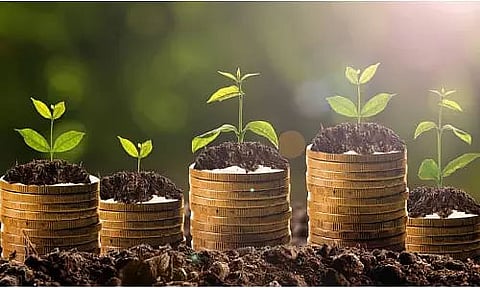
- Home
- Live Blog
- Breaking News
- Top Headlines
- Cities
- NE News
- Sentinel Media
- Sports
- Education
- Jobs

Dr. Rajib Saikia
(raja199@rediffmail.com)
The Global Food Security Index (GFSI), a comprehensive tool developed by The Economist’s Intelligence Unit, offers a bird’s-eye view of the global food security scenario. It evaluates countries based on three crucial pillars: affordability, availability, and quality and safety of food. The 11th edition (2022) of GFSI highlighted that the global food environment has been deteriorating, making it vulnerable to shocks. India’s position on the GFSI reflects a mix of challenges and opportunities, being in the 68th position among 113 countries. While the country has made strides in certain aspects of food security, it continues to grapple with affordability, accessibility, and nutritional quality. This underscores the pressing need for innovative solutions that can address these issues holistically.
With the world’s population booming and environmental challenges rising, traditional farming can’t keep up with the demand for food. Enter nanoagriculture, a modern solution at the intersection of necessity and innovation. Using nanotechnology, it promises a new era of sustainable and secure food production. This cutting-edge approach tackles the shortcomings of old farming methods, offering hope for a future where advanced technology ensures we can feed the world reliably and responsibly. At its core, nanoagriculture leverages nanotechnology to optimize various facets of agricultural practices. From precision farming to sustainable resource management, this innovative approach holds immense potential to positively impact the GFSI indicators.
Nanoagriculture takes precision farming to new heights, deploying smart nano-sensors in soil and crops for real-time monitoring. This precision monitoring significantly improves resource use, directly influencing the affordability and availability pillars of the GFSI. By reducing waste and enhancing efficiency, nanoagriculture effectively tackles the key challenges emphasized by the index. This innovative approach not only marks a departure from traditional farming methods but also serves as a practical solution to meet the standards set by the Global Food Security Index, promising a more sustainable and efficient future for agriculture on a global scale.
Central to nanoagriculture is the development and application of nanofertilizers. In contrast to traditional fertilizers, nanofertilizers offer precision in nutrient delivery, minimizing wastage and maximizing utilization. They address the inefficiencies of their conventional counterparts, ensuring a controlled release of nutrients and mitigating environmental concerns like runoff and pollution. Adaptable to specific soil types and crop needs, nanofertilizers contribute to soil health and sustainable farming practices. Beyond agronomic benefits, they play a pivotal role in bolstering global food security by enhancing crop yields and nutritional value. In essence, nanofertilizers usher in an era of smart, eco-friendly agriculture, promising improved efficiency, reduced environmental impact, and increased food security for a growing global population.
Nanofertilizers in India hold transformative potential. Tailored to diverse soil types, they address specific nutrient needs, potentially revolutionizing agriculture. The use of nanofertilizers emerges as a strategic move towards productive and eco-friendly farming practices, signifying a game-changing approach for the agricultural landscape in the country.
Water scarcity is a significant concern globally. Nanoagriculture addresses this by introducing smart irrigation systems. Nano-sensors monitor soil moisture levels, enabling precise irrigation and reducing water waste. This sustainable water management directly influences the availability of food, aligning with the GFSI’s criteria for assessing a nation’s ability to provide a secure and consistent food supply. Several regions in India face acute water scarcity. Nanoagriculture’s smart irrigation systems, driven by nanosensors, can revolutionize water management. By precisely delivering water to crops as needed, these systems can conserve water and mitigate the impact of water scarcity, especially in arid regions.
Recognizing climate change’s impact on global food security, the GFSI underscores the need for resilience. Nanoagriculture, prioritizing adaptability, becomes a key player in enhancing crop resilience against climate challenges. India, with its varied climates and robust agricultural heritage, encounters distinct challenges in ensuring food security. With a burgeoning population, innovative solutions are critical. Nanoagriculture emerges as a golden opportunity for India to not just tackle GFSI challenges but also usher in a transformative era for its agriculture, aligning with the evolving needs of a dynamic landscape.
In India, where small-scale farmers dominate the agricultural scene, nanoagriculture stands out as a solution tailored for empowerment. Its adaptability and scalability make it ideal for uplifting the livelihoods of millions. From nanoscale pest control measures to customized nanofertilizers for small plots, nanoagriculture promises to revolutionize farming practices, ensuring that even the smallest landholders can benefit. This adaptability addresses the unique challenges faced by India’s agricultural landscape, presenting an inclusive and transformative approach to improve the lives of countless farmers.
In Assam’s agricultural landscape, especially in paddy fields, farmers are conducting trials on nanourea from the Indian Farm Forestry Development Cooperative (IFFCO). Concurrently, nanosprayers are being employed for precise pesticide application. These progressive measures underscore the region’s commitment to innovative and eco-friendly farming practices, showcasing the potential for enhanced efficiency and sustainability in agriculture.
While the promises of nanoagriculture are exciting, it’s essential to acknowledge and address potential challenges. Ethical considerations, environmental impacts, and the equitable distribution of benefits require careful examination. Robust regulatory frameworks, international collaboration, and transparent communication are imperative to ensure the responsible development and deployment of nanoagriculture technologies.
Nanoagriculture stands as a ray of hope, confronting global food security challenges emphasized by the GFSI. With smart sensors, nanofertilizers, and advanced irrigation, it charts a course towards a sustainable and resilient future. Embracing these innovations alongside ethical considerations and global collaboration, we set forth on a journey towards a nourished world where nanoagriculture plays a pivotal role in securing our food future.